#messianic myth
Explore tagged Tumblr posts
Text


This episode was insane but Troy was real for this
#community tv#nbc community#troy barnes#abed nadir#trobed#community fanart#community#troy and abed#alan art stuff#messianic myths and ancient peoples#art#doodles
935 notes
·
View notes
Text
Dan Harmon's career is so funny he created a tv show with takes like "if anything, god is the things we're willing to do for each other" which is still being carefully analyzed by devout fans to this day, but it was a commercial flop.
then he co-created a cartoon with the equal but opposite take "being a self-centred asshole will fuck up your life" and it's a commercial success the likes of which animation has scarcely seen! but the loudest fans misinterpret the show as boasting the idea that awarding yourself the 'tortured genius' label also gives you a green card to be a dick to everyone around you.
fingering a monkey's paw etc.
#dan harmon#community#rick and morty#community episode im referring to is s2e5 'Messianic Myths and Ancient Peoples'
21 notes
·
View notes
Text






this whole episode is a christian episode created by shirley change my mind
"filmmaking beyond film. a metafilm."
16 notes
·
View notes
Text
oh sure so when abed pretends to be jesus and walks around filming himself it’s “cool” and “mysterious” and “sexy”. but when i do it it’s “weird” and “scary” and “get out of this 7-11 theres kids here”
33 notes
·
View notes
Text
Experiencing religious trauma as a queer person has its benefits:
That one episode of Community where Abed Nadir becomes Jesus is especially funny.
You get to enjoy the biblical references in Good Omens (both the book/show and fan-creations).
Um …..
(I guess three would be a greater aesthetic appreciation for Season 2 of Fleabag but to be honest, I think that was more influenced by Contrapoint videos and Mozart’s “Lacrimosa” than anything else.)
#“Messianic Myths and Ancient Peoples” is great#I wish we'd gotten more Shirley and Abed interactions in the show#I also wish we'd just gotten more Shirley in the show overall but that's a matter for another post#Good Omens is great cause it's a story that finally acknowleges that God is as much of a bitch as Satan#I mean - I guess the bible technically does that but .....#abed nadir#good omens#fleabag#lgbtq
12 notes
·
View notes
Text
COMMUNITY REWATCH, 2x05: "Messianic Myths and Ancient Peoples"
-So, Duncan is just spending class time showing YouTube videos?
-I love how confused Pierce is by every video they watch, but hate how sad Shirley is.
-How come Britta is in charge of Pierce's diet?
-Oh no, Pierce is going to start hanging out with Leonard and his friends, isn't he? *sigh* This isn't going to be good.
-Oh Abed, this sounds incredibly complicated.
-That sound cue for "Abed" is so funny.
-Leonard: "Shut your mouth down, fruit." Dean Pelton: "Oh, hey, unacceptable and none of your business, and barely the whole truth." That was more than I needed to know, but I also have questions.....
-Pierce: "Excuse me, mister." Dean Pelton: "What Pierce?" Pierce: "What year is it?" DEAN PELTON YOU KNOW PIERCE! HOW COULD YOU FALL FOR THIS?!?!
-Britta: "Oops, Freudian slip. Perhaps due to my feeling dopey." Shirley: "Do the line, atheist." Damn Shirley.

-I love how you can tell how much Troy and Britta don't want to do this.
-God, I love Abed's costume for his Jesus movie.
-Of course, Chang is involved in Abed's movie.
-The chorus of "Abed" as he is lifted into the air.

-The fact that everyone is so immersed in Abed's movie is both hilarious and ridiculous.
-Damn, that woman was a bit harsh. You don't need to talk to Shirley like that, especially when Shirley is right.
-I love how Jeff and Britta start acting like Pierce's parents.
-Them all screaming in the car and then it cuts to the outside of the car to show the slowest crash ever is hilarious!!!!!
-Abed hating his film is so good.
-Shirley beating up all the equipment with the baseball bat to destroy the movie as a way to answer Abed's prayers is fantastic, but also how does she not get in trouble for destroying school property?
-Jeff acting like a disappointed father picking up his son from jail is great.
-This was a good Abed/Shirley episode.
-This ending scene is so dumb.
#Brittany Watches Community#Community#Messianic Myths and Ancient Peoples#2x05#season two#episode five#John Oliver#Chevy Chase#Yvette Nicole Brown#Gillian Jacobs#Danny Pudi#Richard Erdman#Jim Rash#Donald Glover#Ken Jeong#Joel McHale
0 notes
Text
Controversial opinion among Dune book fans maybe, but I loved the changes they made to Chani's character. Making her a fedaykin who is already an experienced fighter before Paul arrives was a brilliant choice. Dune Part Two is a war movie, and this puts her at the center of the action, side by side with Paul, and gives her a much more active role than she has in the book.
We got a hint of where things were going in the beginning of Dune Part One. The first thing we ever know about movie Chani is that she's a fighter. She serves as a voice for the Fremen, telling us the story of their struggle from her point of view. I wrote here about the difference this change makes compared to other adaptations of Dune, what a perspective shift it is to have the world of Arrakis introduced not by an outsider, describing it as a dangerous but valuable colonial prize, but by one of its native inhabitants, who tells us before all else that it's beautiful, her home that she's fighting to liberate. I am so, so glad that the second movie followed up on this characterization.
I never found Chani and Paul's love story in the book particularly convincing, because why would this woman, who already has a prominent and respected place in Fremen society, even give the time of day to her deposed would-be colonizer, let alone fall in love and have children with him? Without a compelling reason for Chani to love Paul, she ends up feeling like a prize to be won, and "indigenous culture personified as a woman to be wooed (or conquered) by the colonizing man" is a trope we've seen and don't need to repeat.
But as soon as you tell me it's a barricade romance I get it. Cool cool cool, I know exactly what this relationship is now and it makes sense. Movie Chani doesn't respect or even particularly like Paul when she first meets him, and she doesn't think he's the fulfillment of any prophecy. She comes to respect him, and eventually love him, through his actions. He's brave--sometimes recklessly so. He fights well. He's willing to stick his neck out on the front lines with the other Fremen fighters. He can (after a little help) hack surviving in the harsh desert environment. He's not too proud to learn from others. He seems to genuinely want to be her equal in a common political struggle. All these qualities make sense as things she values.
Fighting side by side as equals is just about the only way I can see movie Chani falling for Paul. And it fits perfectly with the film's pattern of reversals that Paul's capacity for violence would initially be one of the things Chani likes about him, only for her to be repelled later when she sees what he becomes.
And as for Paul, well, he's had people deferring to him his entire life. Someone who doesn't take any shit from him is probably refreshing. He seems to like people (Duncan, Gurney) who challenge him and engage in a little friendly teasing--and aren't afraid to go a few rounds in the sparring ring.
It's easy to speedrun a romance when you're spending all your time together in mortal danger fighting for a shared political cause. Especially if you then start winning in a war your people have been fighting for decades. Are you kidding me? That is the perfect environment for intense battle camaraderie to turn into romantic love, and lust.
It makes sense that this version of Chani never believes Paul is any kind of messiah. Of course a character like movie Chani wouldn't believe in or trust some outside savior to liberate them. She's been working to liberate her own people for years. The more Paul invokes the messianic myth, the more he starts sounding once again like someone who plans to rule over them, and the more uncomfortable Chani becomes. In this way she becomes a foil to Jessica, the two of them representing the choices Paul is pulled between. It's a great way of externalizing the political and philosophical debates that often happen within characters' heads in the book.
And of course this version of Chani would leave Paul at the end of the film. It's not just the personal, emotional betrayal--although that stings. What common cause does she have with someone who just declared himself emperor and is sending her own people off in a war of conquest against others? Given the important role she plays in Dune Messiah, I am super curious to see how they get her back into the story, but girl was so valid for being willing to just gtfo. Given that she has the last shot of the whole movie, I'm sure she'll be back somehow, and I can't wait to see what they do with her character in any future installments.
5K notes
·
View notes
Text




Community Season 2, Episode 5: Messianic Myths and Ancient Peoples
*Note: the subtiles don’t show the word “whole”, the dean says “barely the whole truth” in the episode.
1 note
·
View note
Text
Something I want people to keep in mind going forward - the Republican party has been empowered by a certain strain of Evangelical Christianity, and this strain of Evangelical Christianity uses a number of myths to perpetuate itself, including:
Christianity is uniquely capable of providing freedom, peace, and security.
Without Christianity, society would fall into into chaos and ruin.
Jesus was clearly and unambiguously prophesied in the Old Testament hundreds of times, therefore Christianity is the only valid religion.
The gospels are inerrant eyewitness accounts.
And like... none of these are true. Some of them, you can see for yourself just by reading the Bible and paying close enough attention. (There's some notable discrepancies and contradictions in the Gospels that rule out the possibility of eyewitness accounts, and if you read the passages allegedly prophesying Jesus in context, you can see that Christians ripped them out of context and frequently ignored material that would preclude Jesus as the Messiah, like prophecies of temple sacrifices in the Messianic Age.)
Some of them, you can see for yourself just by looking around the world?? Like there's numerous countries that aren't heavily Christian, and like, they aren't necessarily perfect, but they aren't really doing worse than us, either??
Anyway, this strain of religion is used to keep people mindlessly obedient to the Christofascist party line, so it's important to challenge the myths - and if you're already Christian, be willing to open yourself up to hearing some things that might make you question your own beliefs.
526 notes
·
View notes
Text
The Voice from the Outer World
Dune is a story of failure. SPOILERS for Dune Part 2 below
Power corrupts and all of that. We all know this. So we would be able to avoid it, right? If you know what happens you can chose another option. You would be different.
And here's a story that shows that even when you know all of this and more and can literally see the future it's still not enough.
I get why people often think that to avoid this the person in power shouldn't want that power. That this would make them somehow immune. And this logic has multiple faults (like - how can you be good at doing something you hate?) and one of them is that just not wanting to abuse power doesn't mean you would do right things with it.
We are reminded multiple times in the film (and the books also aren't shy about it) that Fremen religious belief in a saviour is not something that arose naturally. It's a belief seeded by Bene Gesserit's Missionaria Protectiva. They seeded superstitions and myths in different cultures so they could use them in a future emergency. Everything Fremen believe about their Mahdi was created so their faith could be used by a Bene Gesserit in need. And both Jessica and Paul are aware of this even before they even set a foot on Arrakis.
It's specifically made for the saviour to be a foreign one (Lisan al-Gaib is The Voice from the Outer World) because the people who made and planned to use this prophecy were ones from an outsider culture. Paul doesn't hijack Fremen beliefs to insert himself as their white saviour. These beliefs was specifically created for someone like him to use.
It was made with purpose of hijacking Fremen religion into protecting the foreigners who know how this prophecy was constructed. This is a parasitic belief (cuckoo-like faith) and the truth doesn't set anyone free. We see why with Stilgar as he wants to believe so much that everything becomes a sign. Even when he's told this has been fabricated and he was manipulated he warps it into something that supports his beliefs not undermines them. I'm sure you've seen this in real life, in real politics if not religion.
Jessica and Chani got changed the most from their book versions. They've become opposite sides of the ideological divide. Not between religion and lack of it - Jessica obviously not a believer - but between using people and letting them decide their own future.
Book Jessica is more apprehensive of Paul's choices. She's often more worried he may not survive the trials than pushing for them for power. In here she becomes the driving force for using the messianic belief Bene Gesserit implanted for Paul's benefit. She makes sure Fremen believe he fits the story. She doesn't care about Paul's wishes to avoid this burden. She knows it doesn't matter when he tells the people the truth about Bene Gesserit, their abilities and their manipulation techniques. Belief is impervious to proof and confirmation bias makes you reject all evidence to the contrary.
But then, in the film, Jessica is kind of possessed. Stilgar warns Paul not to listen to the djinn but neither he nor his mother can stop listening to the voices. The film removes Alia's book doings but replaces them with foreshadowing of what she becomes. She whispers the truths about the future to her mother even before she is born. Funny, how this change makes her, not Paul, the first fully prescient Atreides. She is manipulating the events when Paul refuses to and that's a foreshadowing too. When Jessica took the Water of Life while pregnant she did it for the power this new position among the Fremen would give her. Alia never stood a chance. She was pre-born into this.
The only one trying to stand in the way of succumbing to the power corruption is movie version of Chani. She was never believer in a saviour. She wants her people to save themselves. They already have a plan for a better future that doesn't involve killing worlds for the Empire they never wanted anything to do with. They were not supposed to be warriors of the prophet. She sees this for what it is - a way to control her people. She understands this is just another form of enslavement. The only difference is that this one is embraced. No one listens to her when she tells them the truth. They only see what they want to see.
The power that comes from being close to the rule is just as blinding when you stand close to the throne as it is when you sit on it.
And the sad part is she knows she played a part in this happening to as she convinced Paul to give this a try. She didn't see the visions he saw so she hoped he can remain the person she fell in love with. When he submits to the way prescience shows him and takes over the faith we feel her heartbreak. She watches him becoming what he feared and everyone around him stops her from trying to save him because they get something out of it (not just the other Fremen or Jessica - Gurney puts atomic arsenal in Paul's hands).
Paul doesn't bring freedom. He just changes who holds the power but in the end the structures of power remain (the similarities between Saudarkar and Fremen are not accidental). And billions die so it can happen. But billions is a an abstract number. It's much easier to feel the consequences when they hit close and personal.
Everyone around Paul gets to gain something - Gurney gets revenge on Rabban, Jessica and Stilgar get to destroy the Harkonnens and the Emperor. They are on top now. The power corrupts before you even hold it. Just the promise of power is enough.
This film version of Chani doesn't let us forget that this is what we watch. That what is happening is not a good thing. We as humans have tendency to gloss over big numbers of deaths when it's some unseen people with whom we have no emotional connections. Through her eyes the loss is so much more personal. She loses her Usul to Paul Muad'Dib. And he takes her people and her planet too.
As Paul says - they are Harkonnens too. And they do what Harkonnens do too. The difference was always cosmetic.
And one more thing. A lot is said about Arabic and Muslim influences in Fremen culture and religion but they aren't the only ones. One other is the word used for the places where Fremen live - Sietch. It comes from Zaporozhian Cossack name for their fortified encampments - sich.
In the West the name Cossacks invokes the cruel Russian Imperial forces that tsars used to pacify conquered territories. But this is not what comes to my mind first. In the Polish-Lithuanian Commonwealth they were free people living in the borderlands of the Commonwealth on the territories often attacked by the Ottomans. The constant raids from the Turks meant they were warriors and constantly moving. But this also allowed for a lot of freedom as there wasn't a lot of direct control over these territories for the same reason. This meant that they were often joined by anyone wishing to have that freedom - from peasants escaping indenture to nobles escaping the law.
The dissatisfaction with the Polish rule eventually lead to an uprising and this part of Ukraine joined Russian Empire. That Empire destroyed all the freedoms Cossacks had and those independent warriors became just another enforcers of conformity for the Empire. They've become exactly what they fought against. I often wondered if Herbert chose the name Sietch intentionally to invoke this turn of events.
#dune#paul atreides#jessica atreides#lady jessica#alia atreides#chani kynes#stilgar#fremen#bene gesserit#harkonnens#lisan al-gaib#muad'dib#usul#dune part 2#dune part two#dune 2024#dune part two spoilers#dune part 2 spoilers#arrakis
1K notes
·
View notes
Text





COMMUNITY (2009) ∙ S2.E5: "Messianic Myths and Ancient Peoples"
#community#community tv#community nbc#nbc community#abed nadir#britta perry#pierce hawthorne#communityedit#dailyflicks#cinemapix#usersitcom#tvedit#my gifs
365 notes
·
View notes
Note
Hi Mr Gaiman! What do you think of Good Omens being rewritten from a Jewish perspective instead of a Christian one? (not for profit or anything just a fun idea to explore the theological differences through a work I adore)
If by "a Jewish Perspective" you mean, not using any material from the New Testament, you'd need to tell a very alternate universe version in your version of the story. Demons (and dybbuks) would exist, although there are different Jewish traditions about what they are -- but the concept of Fallen Angels isn't ever part of the story, so the Crowley and Aziraphale story might be a little harder to pull off. You'd lose the Four Horsemen, of course.
Here's a lovely article on Demonology from a Jewish perspective over the centuries: https://www.jewishvirtuallibrary.org/demons-and-demonology
You still have the apocalypse, of course (lots of lovely apocalypses predicted) but they tend to tie in to messianism. So you'd probably have Crowley and Aziraphale working to stop the Messiah from turning up and ending the world.
(Here's a great set of essays on Jewish Apocalypses: https://www.associationforjewishstudies.org/docs/default-source/ajs-perspectives/ajsp12fa.pdf?sfvrsn=17fadb06_2)
It's not really theological differences, though. Both Good Omens and your hypothetically More Jewish version would primarily be leaning into cultural myths and stories and stuff that aren't anywhere in the Bible anyway.
(And the original Good Omens was at least half-written from a Jewish perspective: mine.)
5K notes
·
View notes
Text
guys guys guys:
theory here.
what if the community movie is just a film about a film, like in Messianic Myths and Ancient Peoples (season 2 episode 5). What if the movie is too good to ever truly exist, and is made to be a spectacle, not for our eyes to consume. As abed says,
“See, in the filmmaker's film, Jesus is a filmmaker trying to find God with his camera. But then the filmmaker realises that he's actually Jesus and he's being filmed by God's camera, and it goes like that forever in both directions like a mirror in a mirror, because all of the filmmakers are Jesus and all of their cameras are God, and the movie's called: "ABED" - all caps. Filmmaking beyond film. A meta-film. My masterpiece.”
I think i’m on to something.
But thats just a theory!
A COMMUNITY NBC THEORY!
#i might be going insane#lol#study room f#community show#community tv#community the show#community aesthetic#pretty little aesthetics#community nbc#abed community#abed nadir#nbc community#abed#community nbc movie#6 seasons and a movie#six seasons and a movie
27 notes
·
View notes
Text
Once and Future Royalty
Just, stay with me on this one. I know its going to look crazy at the start, but trust me, I know where I'm going.
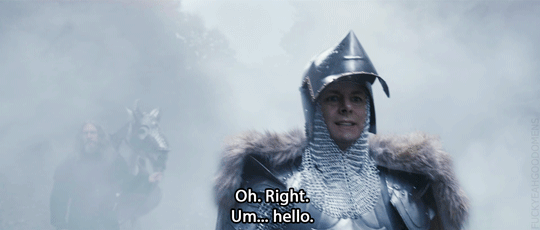
It all started with the 537AD scene in Wessex in the opening montage of "Hard Times," S1E3. Yeah, the one where Aziraphale is supposed to be a knight of the Round Table and Crowley is role-playing the Black Knight, and they are both so super-squeaky shiny clean - not a speck of dirt or mud on them. wtf! It looks out of place, unrealistic, and was bugging the crap out of me, like a stone in your shoe. It just didn't fit. I mean, why put a myth, a legend, into that sequence? Oh, OK, yeah, the preceding stories from the Bible, like the Garden of Eden and the Flood, aren't "myths" as well, you say? Hmm. In the context of the Good Omens AU, being a biblical based story, they belong there far more than the legend of King Arthur.
King Arthur, who supposedly united Britain under his rule during the late 5th century and early 6th century, was shown to have the divine right to rule by wielding the mighty sword Excalibur. Some stories tell of Arthur pulling Excalibur from a stone. Some tell of him receiving Excalibur from the Lady of the Lake. Either way, it was bestowed upon him by divine grace. Despite his triumph in battle, he left no heirs, as his queen, the fair Guinevere, was barren. She had a long-running love affair with the greatest knight of the court, Sir Lancelot, but despite this being an open secret in court Arthur would not put her aside. The knights of the Round Table in the court of Camelot were near-paragons of Christian virtue, and there are many tales of their search for the Holy Grail, the cup from the Last Supper of Jesus Christ.
In the end, mortally wounded in battle, Arthur was taken away for healing, and never seen again. It was said he would return when Britain was at it most direst hour to save the day once more. A "messianic" return.
The Once and Future King.
Now, I'm no Arthurian novice; I drank up all of T. H. White as a teenager, read the Dark is Rising multiple times, Marion Zimmer Bradley's interpretation and what ever else I could lay my hands on for a good couple of decades. And there is LOTS of King Arthur stuff around. You are not left wanting for anything new to read or consume. And I'll bet there are a fair few of you also out there who know a quite bit about the legend as well. Oh, and I can't tell you how many times I have watched Monty Python and the Holy Grail. I still walk around quoting it day-to-day, like the good little Gen-Xer I am, having grown up on that stuff. So I really should have listened to my intuition when bits of Monty Python kept popping up in my brain in response to other parts of GO I was thinking about. (Staaay, I said, stay with me here....)

I kept chewing away furiously on the Wessex problem, growling in feral frustration at it, but also kept reading and sorting out some other ideas and metas at the same time. Eventually I found the key in a tiny little post, about a small detail in the 1941 Blitz episode S2E4, of all places. I wanted to slap myself with how much was staring me in the face so obviously once the door opened. And the damn beauty of it is, that I already written about some it, out of context, without knowing the why.
OK. Where to start this journey...hmmm, back to Monty Python, because, guess what - the Wessex scene is actually riffing off one the more famous skits out the the Holy Grail. The scene is a masterpiece of political satire, from start to finish, but the relevant part here is this sequence:

In case you missed the salient points: Arthur claims he is king by divine providence, because he was given Excalibur by the Lady of the Lake. Dennis the peasant protests this waterlogged method of determination, mentioning ponds, watery tarts and a moistened... well, I hope you get the idea about where this is going.
Meanwhile, in 537AD, Wessex, as the mist swirls around them:
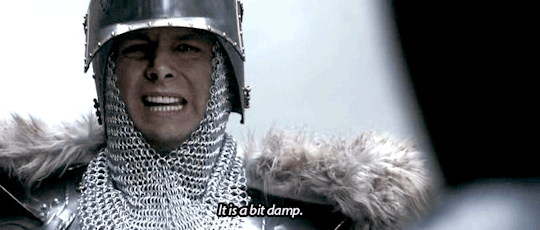
"It is a bit damp," complains a shiny silver Aziraphale.
Yes, Excalibur would be a bit damp after it emerged from the Lake. (vidavalor! Get your mind out of the gutter! I'm trying to have a serious discussion here! Please! And I wasn't even going to go anywhere near what the sword in the stone is really meant to be referring to...it's not even relevant to the discussion at hand, I swear! Well, there is going to be sexual relations mentioned but - oh, never mind...)
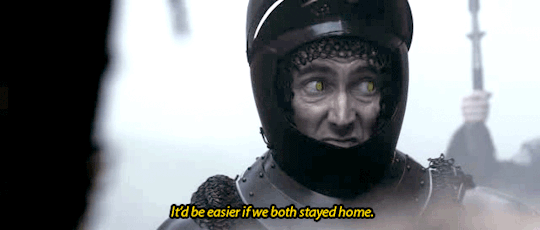
Right. Where were we. Lets leave those super-clean elite pretendy knights to swim off through the swirling mist back to their dry homes to write and file reports to head office, along with Patsy and the hired Igors, and Dennis can keep playing in his lovely muddy filth after he finishes protesting being repressed by the divinely-deluded Arthur. I've got a bit more to say about what Aziraphale and Crowley might represent here later but you need some more context first, so lets move on. I just needed to show you the first bit so you can see the Arthurian theme stretches across both S1 and S2, and will likely appear in S3 as well. More about that towards the end.
Ah, before I forget...another ref from the Holy Grail we need to cover:

This GIF, unfortunately, doesn't have the full exchange between the peasants, which is this:
P1: "Who's that then?" P2: "I don't know. Must be a king." P1: "How can you tell?" P2: "Because he doesn't have any shit on him."
Ah. Er. OH!
Have you made the connection?
Who have I been emphasizing as being unusually clean in their Arthurian setting? That's right, Aziraphale and Crowley.
What's this implying? That they are royalty. Celestial royalty. Maybe not kings, but how about princes? You know how we've been discussing whether Crowley was a once at least an Archangel, and there is even a hint that he was a fallen prince of Heaven given during the replay of Gabriel's trial? (Not the prince, but a prince - a seraphim) And that Aziraphale may have once been Raphael, and may be again in the future? Once and future royalty. To me it adds weight to the past discussion, and helps to explain the assumed authority expressed in these two scenes here: On the left, Aziraphale takes control inside the book shop as the angels and demons argue who is going to punish Gabriel and Beelzebub (finally found it after several months!) and on the right, Crowley is shouting at the assembling demons in the street that they are "out of order."

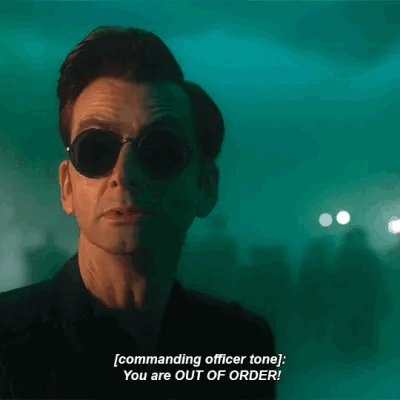
Onward, Patsy. (I hope you're still with me.)
1941, the Blitz part 2, minisode.
We've found Excalibur! On to Camelot!
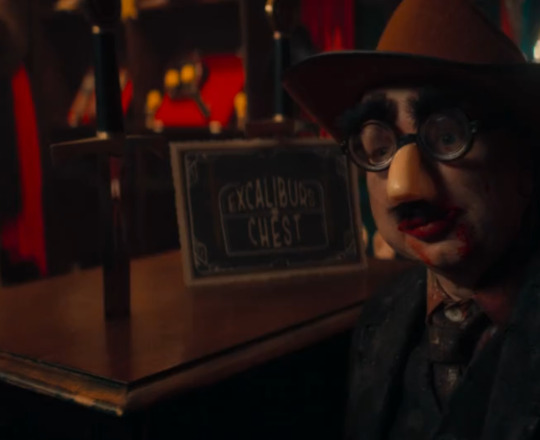
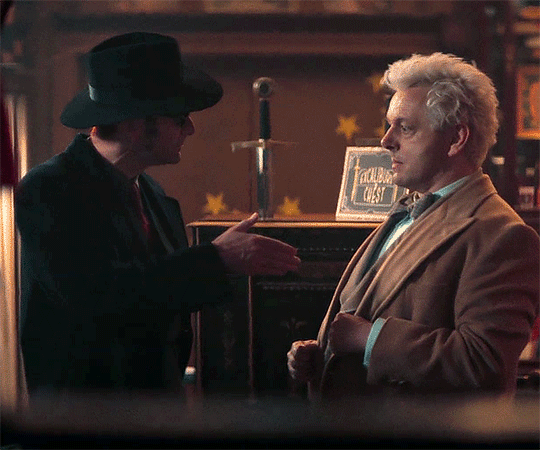
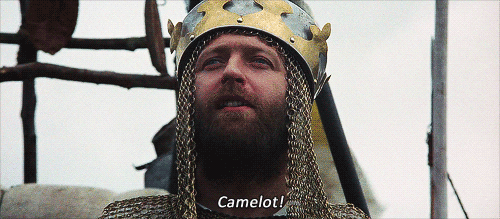
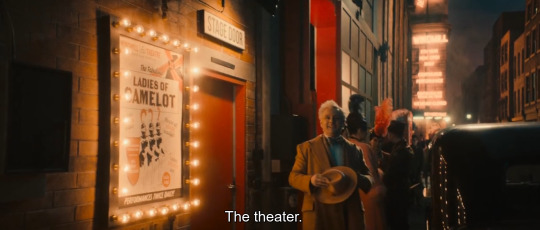

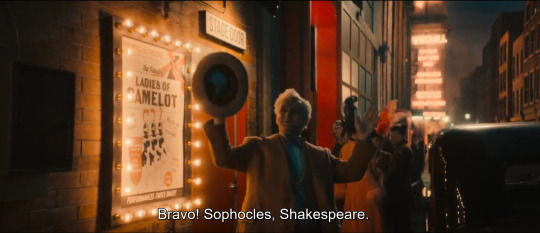
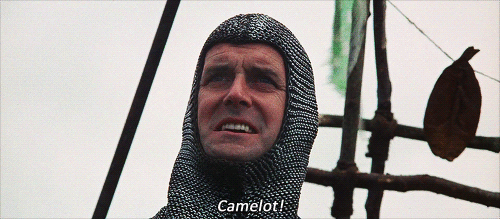


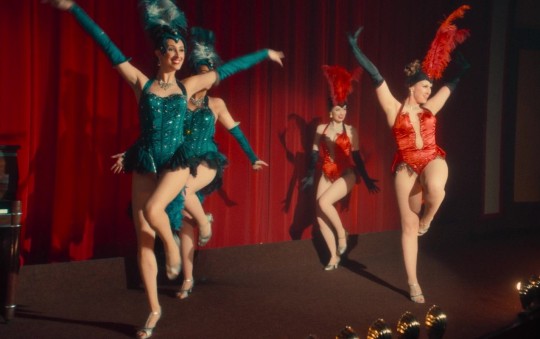

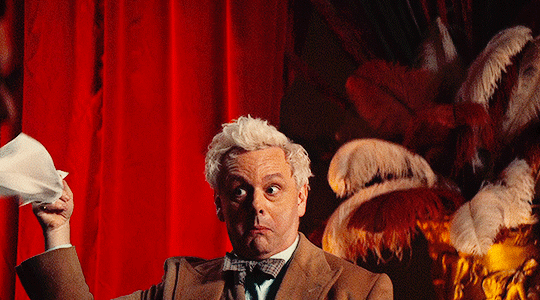
[Edit note: I've added a few GIFs and screen shots into the sequence of parallels above because I was thinking over a few things since I posted and felt this actually sat better. To try and explain, as they don't exactly match as I would like, in the Holy Grail movie, King Arthur and the knights he has gathered rock up at the foot of Camelot and gaze up in awe at it. "Camelot!" Arthur declares to the party. "Camelot!" Galahad echoes in excitement. And a third "Camelot!" comes from Lancelot. What do we get in GO? Aziraphale leaps out of the Bentley (Crowley's black horse) and declares "The theater! Sophocles! Shakespeare!" I swear, if you put the two side by side, they would match. It's not just a reminder of how much time Aziraphale has seen pass by, or that we are seeing a tragedy play out. But damn it, I could so just see Aziraphale attending a Sophocles performance in Athens back in the day...]
Camelot was King Arthur's castle and home of his court. In S2 of GO the Windmill Theater is established as our court of Camelot where our 1941 Blitz-era Arthurian drama is to play out, involving Furfur and the zombies.
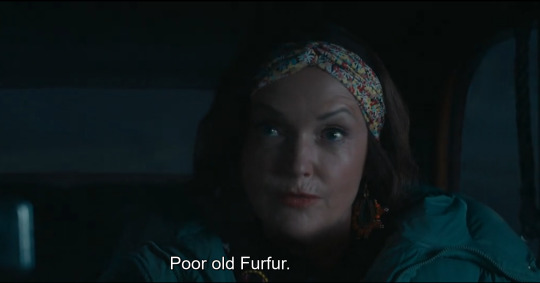
Yes, poor old Furfur. Two's company, three's a crowd, as they say. Now we know we're in Camelot, we need to be reminded of the central tragedy of the Arthurian story, that ultimately led to the golden kingdom's fall. Lady Guinevere, Arthur's queen, famously loved Sir Lancelot, and the two were passionate lovers. It was essentially a love-triangle at the top, with Arthur being jilted, but he wouldn't/couldn't discard his queen. Where do we see this playing out in 1941?
Furfur, pleased with himself for catching an angel and a demon in the act of consorting together (with the help of the zombies,) barges into the backstage dressing room, and confronts the lovers with their crime. But who is playing who in the Arthurian love triangle? I would say Furfur is clearly caught in the role of Arthur here. Consider the following exchange:
FURFUR: Hmm, well, well, well… What have we here? AZIRAPHALE: Sorry, have we met? FURFUR: Oh, no, you never had the pleasure, but… we have, haven't we? CROWLEY: Have we? FURFUR: What do you mean "have we?" You know we have. We were in the same legion. Just before the Fall. Doing dubious battle on the plains of Heaven. Remember? CROWLEY: I remember going into battle, I don't remember being there with you. Sorry. FURFUR: I was right next to you. We did loads together. You use to jump on me back, little monkey in the waistcoat. Anyway, whether you do or whether you don't, it doesn't matter. I'm here to inform you, as a representative of the Higher Powers of Hell, that you, Crowley, are in breach of the Infernal Code. Consulting and collaborating with an angel, Fell the Marvelous, aka… [opens book] Azirapalala. Azirapapap. Aziphapalala. AZIRAPHALE: [annoyed] Aziraphale

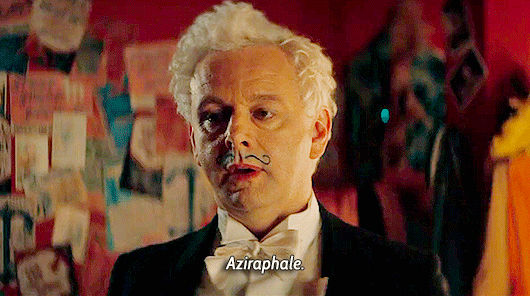
Furfur claims a past intimate relationship with Crowley, which Crowley spurns offhandedly. Crowley is playing Guinevere here, jilting Furfur/Arthur, which leaves the demon-smiting Aziraphale standing in for the handsome hero Lancelot (with his French connections, no less), and doesn't he make us weak at the knees when he drops his voice an octave in dominating disgust. (Is it suddenly getting hot in here...? Phew!)
Interestingly, looking back in S1 at 537AD Wessex, though, I would say that Crowley was Lancelot as the Black Knight, a role that Lancelot sometimes played in the legends, and Aziraphale would then be the fair maiden Guinevere. It certainly plays into Crowley's long term role of playing the knight who comes to the rescue of Aziraphale's princess in distress. Excalibur was no where in sight, perhaps still beneath the waters of the lake. Nor Arthur. Perhaps it was still too early in the story then...
I had originally suggested in my very first post that Furfur was given a stag as his demon avatar because he was wearing horns for being cuckolded by Crowley. But I wasn't quite thinking about it in context with the Arthurian legend! The stag is also often associated with royalty, plus while wandering around the medieval bestiary website that someone linked to, it interestingly notes that the enemy of the snake is the stag and the stork (Shax's avatar.) Ah ha!
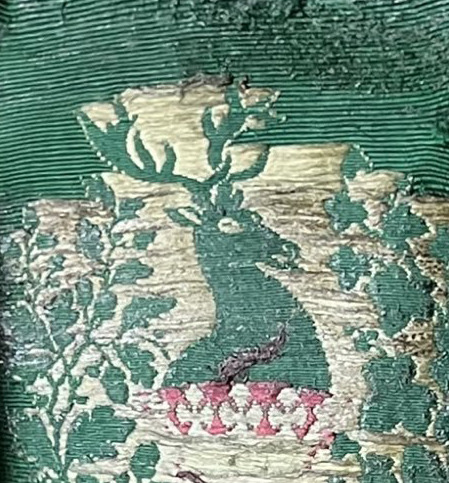
So how can we extrapolate this knowledge into a possible appearance of the Arthurian theme in S3?
Will we see the love triangle of Arthur/Guinevere/Lancelot come back into play and cause more chaos? I'm wondering if it might have something to do with the Fall.
Or will our lovers bring down a divinely-appointed ruler via their committed behind-the-back defiance of expected propriety?
Will Excalibur appear from beneath the waters, perhaps in another form, to declare a new king?
Could it even be a combination Jesus/Arthur, King of the World, returned? And they turn out to be a very naughty boy, disappearing into the night clubs of Times Square, New York, and that's how they lose him? (Social media viral sensation, anyone?)
I wouldn't be half-surprised if Greasy Johnson's name turns out to be Arthur, actually.
And no, I haven't forgotten that Adam's dad was named Arthur as well.
Bring on S3!
**Bonus**
If you've made it this far and you're thinking:
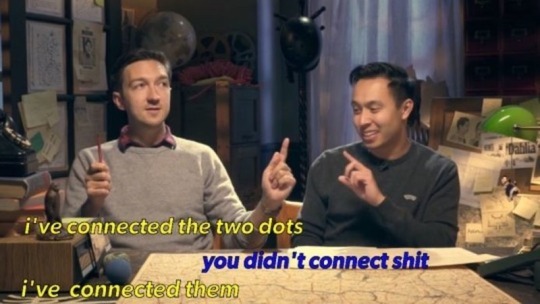
Let me leave you with this last connection.
In the back stage change room, remember Furfur delivers these lines:
FURFUR: What do you mean "have we?" You know we have. We were in the same legion. Just before the Fall. Doing dubious battle on the plains of Heaven. Remember?
On the first level, he is referring the Great War in the Good Omens AU.
On the second level, Furfur is paraphrasing Milton's Paradise Lost.
On a third level, I can (and will in a future meta) connect this back to the training initiative paintball fight at Tadfield Manor in S1.
And even deeper on a fourth level, if you do know the Holy Grail movie well, you'll remember there is an odd little subplot in it, that infers that the whole King Arthur and his knights thing is merely a full-on violent cosplay that is murderously rampaging across the countryside in the present day with the police in hot pursuit. It's a strange juxtaposition between reality and dream, and you aren't quite sure what it is real or not. The ending is bizarrely and abruptly surreal as the two story lines collide in the heat of battle, as the police turn up and arrest the combatants. A bit like this:

#good omens#good omens 2#good omens meta#good omens analysis#aziraphale#crowley#king arthur#king of the who?#the return of king arthur#excalibur#the lady of the lake#watery tarts#monty python#monty python and the holy grail#run away#camelot#arthurian legend#ladies of camelot#guinevere#lancelot#the once and future king#once and future royalty#good omens 1941#furfur#shax#dubious battle on the plains of heaven#tadfield manor
182 notes
·
View notes
Text
Remembering how Game of Thrones tried and failed to make a convincing argument that Jon Snow was “the true king all along !1!1”, mostly because they removed all the myth and wonder that makes this trope land in the books. Because, don’t get it twisted, I absolutely believe the books are getting to this in some way. But it works because GRRM is intentionally recreating King Arthur’s origin story, with all its magic and whimsy front and center. GRRM knows and intends for Jon to be the clichéd fantasy protagonist: he’s got a magic pet, a magic sword (that’s about to be even more magic soon), magic powers, a magic lineage, and an obvious magic destiny. Book!Jon is the very idea of fantasy, the quintessential fantasy character - and like, THAT’S THE POINT! It’s why he’s literally every classic fantasy trope mixed into one. But none of this is present in the show. He’s got no magic, neither does his very normal pet, his magic lineage means nothing, and his magic destiny is laughably pushed to the side because the writers need to subvert expectations. Show!Jon is just some guy whereas book!Jon is meant to be THE guy. All signs in the narrative point to this.
And I think one of the biggest indicators of the show runners just not getting itᵀᴹ is the Tower of Joy sequence, which is meant to serve as a masterclass for fantasy protag myth building 101. The book version has: the most legendary sword known to man, the most legendary knight of all time, the leader of a legendary band of white knights, a powerful noble, a princess queen of love and beauty in a tower, a newly risen king, the shadow of a dead prince who was heir to the throne, obvious messianic imagery (e.g., three wise men witnessing the birth of a promised king), several metaphorical falling stars (Arthur, Ashara, Dawn disappearing for years afterward), etc, etc. So when the narrative beats it over our heads that Jon is “le true king”, it makes sense because the imagery and symbolism has been injected into the story to back this claim up. From a genre perspective, it’s not so much avoiding a trope but reinforcing it (though with several twists). The show version of Jon’s birth is some random dudes (names not provided) fighting for vague reasons (they cut out all the meaningful, character building dialogue). Show!Jon’s birth is not a mythological event heralding a king. But the show runners want to cheat and claim Jon to be the true king without doing any of the legwork. It just doesn’t land at all, and this pattern bleeds into them trying to claim Jon as tptwp…except show!Jon has no magic powers to back up that claim, unlike book!Jon who is a walking power plant. So even if they did come to a (mostly) correct assumption - that Jon is the king - how it’s written is so mind-numbingly bad that it doesn’t even matter anyway.
#jon snow#asoiaf#game of thrones#books vs show#the very definition of - ‘she (book!jon) looked absolutely beautiful….and he’s (show!jon) there 😐’#reason 1456789997643 why show!jon sucks donkey balls#I have a lot more to say in this topic but I’m too tired so I’ll just leave things here
109 notes
·
View notes
Text
I really wish we got more of shirley and abed’s relationship. abed finally having a consistent mother-like figure in his life has so much storywriting and character building potential (and it’s also just really important to me lmao), plus shirley being able to connect with aspects of life she’s historically been pretty far removed from (other religions/cultural practices, pop culture, just general neurodivergency etc) is so good for her character, and it exposes sides of her we don’t see too often.
we get bits of their dynamic in basic genealogy, messianic myths and ancient peoples, and introduction to teaching, but that’s basically it I think. they’re just really important to me and I wish the writers had explored their relationship a bit more
#I could talk about them forever#them and then annie&troy are my favorite underrated duos I love them so much#community#nbc community#community nbc#shirley bennett#abed nadir
254 notes
·
View notes